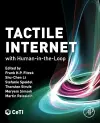
Tactile Internet
6 contributors - Paperback
£98.95
Frank H. P. Fitzek is a Professor and head of the “Deutsche Telekom Chair of Communication Networks at TU Dresden coordinating the 5G Lab Germany. He is the spokesman of the DFG Cluster of Excellence “Center for Tactile Internet (CeTI). He received his diploma (Dipl.-Ing.) degree in electrical engineering from the University of Technology – Rheinisch-Westfälische Technische Hochschule (RWTH) – Aachen, Germany, in 1997 and his Ph.D. (Dr.-Ing.) in Electrical Engineering from the Technical University Berlin, Germany in 2002 and became Adjunct Professor at the University of Ferrara, Italy in the same year. In 2003 he joined Aalborg University as Professor . Shu-Chen Li obtained her Ph.D. from the University of Oklahoma, USA (1994) and completed her postdoctoral training at the McGill University in Montréal, Canada (1995), prior to her 17-year research career at the Max Planck Institute (MPI) for Human Development in Berlin, Germany. After being a senior research scientist and the principal investigator of the Neuromodulation of Lifespan Cognition Project at the MPI, she took up a full professorship as the chair of Lifespan Developmental Neuroscience in the Department of Psychology at TU Dresden (Technische Universität Dresden) in September 2012. She serves on the editorial boards of various journals (e.g., Neuroscience and Biobehavioral Reviews) and grant review panels Stefanie Speidel is a full professor for “Translational Surgical Oncology at the National Center for Tumor Diseases (NCT) Dresden since 2017. She received her PhD (Dr.-Ing.) from Karlsruhe Institute of Technology (KIT) with distinction in 2009 in the context of the research training group “Intelligent Surgery (KIT, University of Heidelberg, DKFZ) and had a junior research group “Computer-Assisted Surgery from 2012 – 2016 at KIT. Her current research interests include image- and robotic-guided surgery in the context of the future operating room. She has been (co)-authoring more than 100 publications and regularly organizes workshops and challenges including the Endoscopic Vision Challenge@MICCAI as well as the Surgical Data Science workshop. She is member of several Program Committees of international conferences, such as MICCAI, CARS, SPIE Medical Imaging and has been general chair and program chair for a number of international events including IPCAI and MICCAI conference. She has been principal investigator on a number of research grants and received several best paper awards. Thorsten Strufe is professor for Privacy and IT-Security at Technische Universität Dresden, vice speaker of the German Cluster of Excellence on Tactile Internet with human-in-the-loop CeTI?, PI of the Joint Research Centre HAEC?, PI of the Graduate School "RoSI?", and PI of the 5G-Lab Germany. His research interests lie in the areas of large scale distributed systems and social networking services, with an emphasis on privacy and resilience. Recently, he has focused on studying user behavior and security in online social networks and possibilities to provide privacy-preserving and secure social networking services, partially through decentralization. One of the challenges driving him is the question, how competitive online and mobile services can be created without comprehensive collection of personal information, which hence respect the privacy of their users. He was appointed professor for for Peer-to-Peer networks at Technische Universität Darmstadt, Germany, from 2009 to 2014, and visiting professor for Dependable Distributed Systems at University of Mannheim, Germany, throughout 2011. Dr. Meryem Simsek received her Dipl.-Ing. degree in Electrical Engineering and Information Technology from University of Duisburg-Essen in Germany in 2008, holding a scholarship from the German National Academic Foundation which is granted to the outstanding 0.5% of all students in Germany. She obtained her Ph.D. degree on reinforcement learning based inter-cell interference coordination in heterogeneous networks from the same university in 2013. In 2013, she was a post-doctoral visiting scientist at Florida International University. In 2014, she became a group leader at the Vodafone Chair Mobile Communication Systems at the Technical University Dresden, Germany. Dr. Simsek won the IEEE Communications Society Fred W. Ellersick Prize 2015. Since June 2015, she chairs the IEEE ComSoc Tactile Internet technical sub-committee and has initiated the IEEE P1918.1 working group and is serving as the secretary of the working group. In addition, she is leading the ETSI IP6 work item on IPv6 based Tactile Internet. She joined ICSI in October 2016. Her main research interests include fifth generation (5G) wireless systems, resource management in heterogeneous wireless networks, wireless network design and optimization, self-organizing networks, and the Tactile Internet and its applications. Martin Reisslein is a Professor in the School of Electrical, Computer, and Energy Engineering at Arizona State University (ASU), Tempe, and an external associated investigator with the Centre for Tactile Internet with Human-in-the-Loop (CeTI), Technische Universit\"{a}t Dresden, Germany. He received the Ph.D. in systems engineering from the University of Pennsylvania in 1998. He currently serves as Associate Editor for the IEEE Transactions on Mobile Computing, the IEEE Transactions on Education, and IEEE Access, as well as Computer Networks (Elsevier). He is an Associate Editor-in-Chief of the IEEE Communications Surveys & Tutorials and a Co-Editor-in-Chief of Optical Switching and Networking (Elsevier). He chaired the steering committee of the IEEE Transactions on Multimedia from 2017-2019 and was an Associate Editor of the IEEE/ACM Transaction on Networking from 2009-2013. He received the IEEE Communications Society Best Tutorial Paper Award in 2008, a Friedrich Wilhelm Bessel Research Award from the Alexander von Humboldt Foundation in 2015, as well as a DRESDEN Senior Fellowship in 2016 and in 2019.